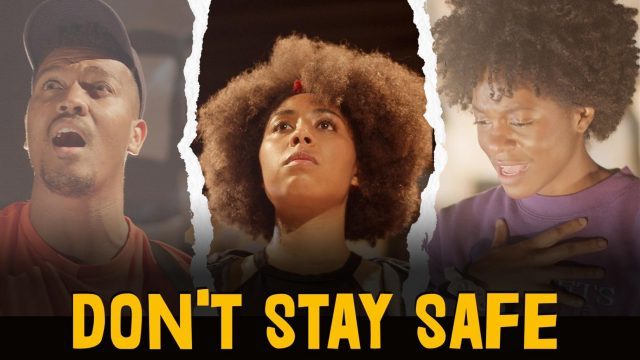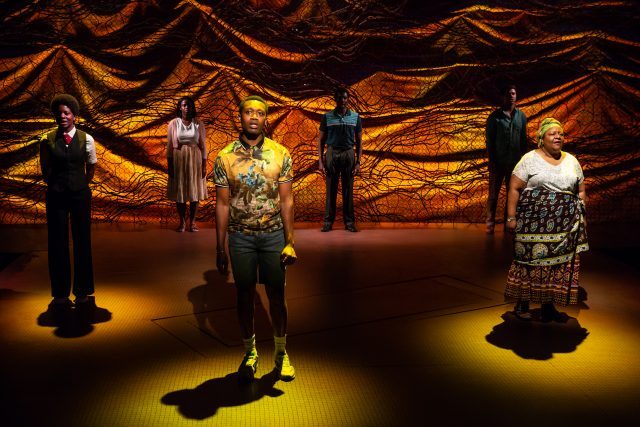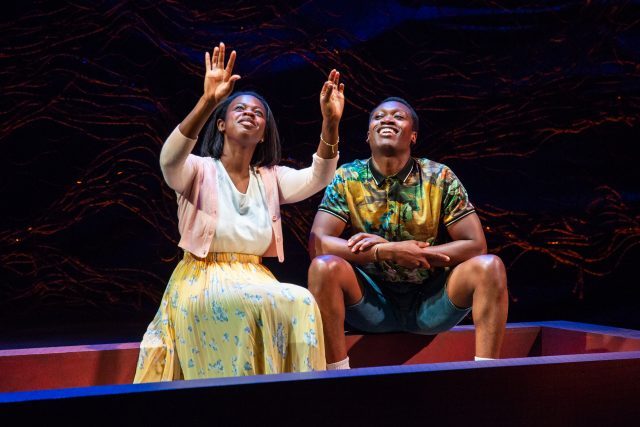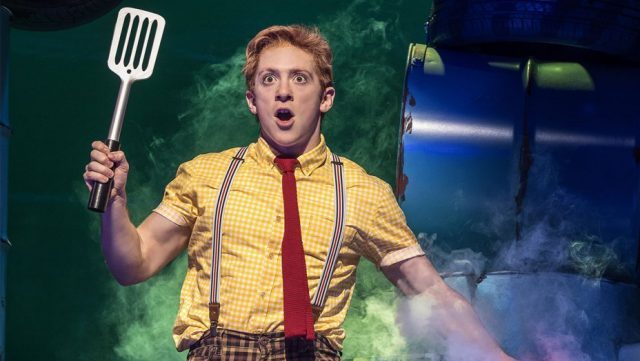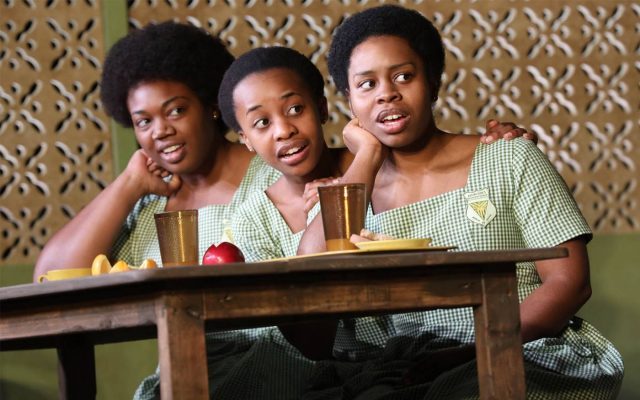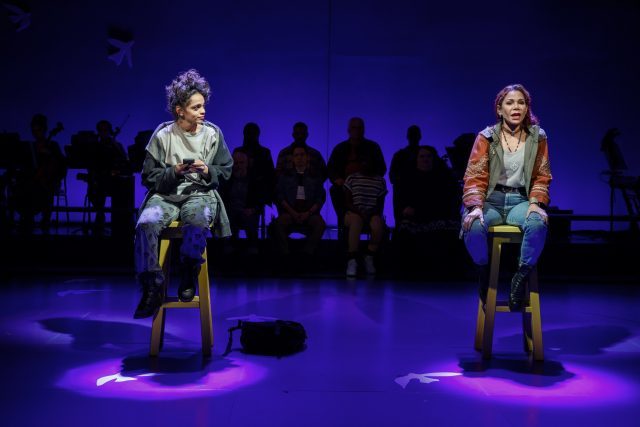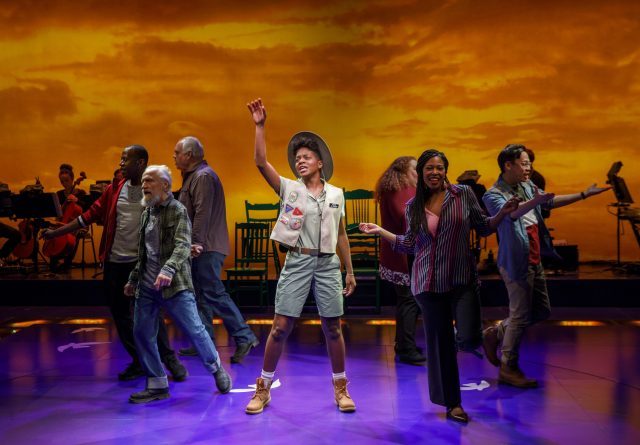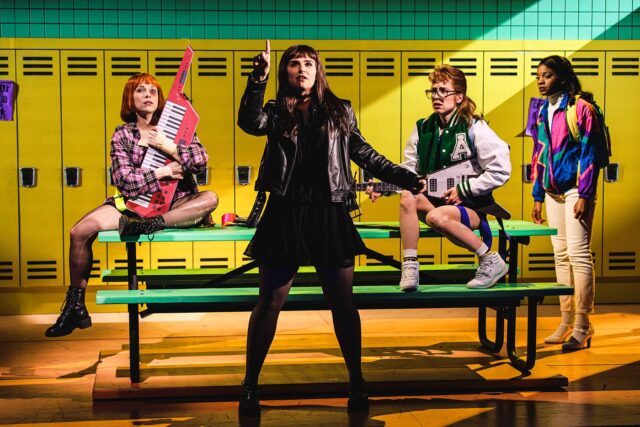
Keesha (Latoya Edwards) teams up with Megan White (Molly Hager), Maegan Whitehall (Alyse Alan Louis), and Meagan Whitehead (Lauren Marcus) in White Girl in Danger (photo by Marc J. Franklin)
WHITE GIRL IN DANGER
2econd Stage Theater
Tony Kiser Theater
305 West 43rd St. between Eighth & Ninth Aves.
Tuesday – Sunday through May 21, $46-$86
www.2st.com
vineyardtheatre.org
Near the end of Michael R. Jackson’s bewildering White Girl in Danger, the follow-up to his Pulitzer Prize–winning hit A Strange Loop, a surprise character previously heard in voiceover but not seen appears as a kind of explanatory deus ex machina.
“I know. It’s very confusing, so why don’t you two have a seat and allow me to reintroduce myself,” the character tells Keesha Gibbs and her mother, Nell. Unfortunately, his stirring monologue comes too late to rescue the nearly three-hour musical, a baffling tale coproduced by Second Stage and the Vineyard and in desperate need of a dramaturg and an editor with sharp scissors. It’s as if the companies were so thrilled to have Jackson on their roster that they let him do whatever he wanted, with no one saying, hey, wait a minute. . . .
White Girl in Danger takes place in the land of Allwhite, referred to in the opening song as “a world of intrigue and mystery / a world of endless story / a world where there’s no singular destiny / So as the world turns around, we see / protagonists of all variety / they’re characters on White Girl in Danger / a soap opera on your TV / And all of them are Allwhite.” Jackson was inspired to write the show because of his love of soap operas and Lifetime movies; there are references to General Hospital, The Guiding Light, The Bold and the Beautiful, As the World Turns, and other favorites scattered throughout, most likely lost on the younger audience members who embraced A Strange Loop.
Among the denizens of Allwhite are the trio of Megan White (Molly Hager), Maegan Whitehall (Alyse Alan Louis), and Meagan Whitehead (Lauren Marcus), whose first names are pronounced differently and who together represent problems often associated with troubled white suburban teens (anorexia, drugs, daddy issues, self-harm); their boyfriends Matthew S, Scott M, and Zack Paul Gosselar (all played by Eric William Morris, the last a reference to Mark-Paul Gosselar, who starred as Zack in the sitcom Saved by the Bell), a cutie, a toughie, and a sex-obsessed psycho; and the girls’ mothers, Diane Whitehead, Barbara Whitehall, and Judith White, (Liz Lark Brown), who range from trashy to flashy to overprotective.
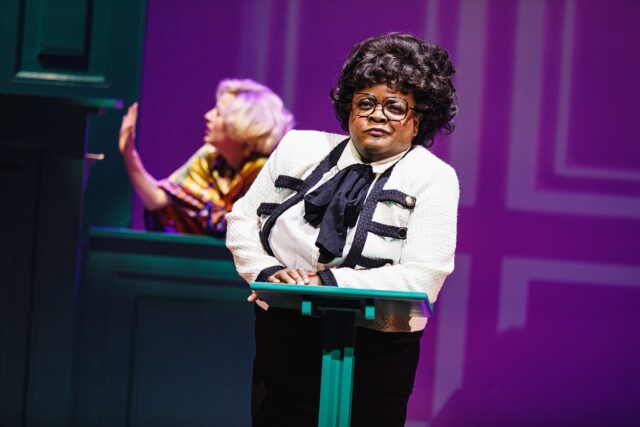
Nell (Tarra Conner Jones) changes jobs throughout Michael R. Jackson’s second musical (photo by Marc J. Franklin)
“Danger! Danger! Danger! Danger!” the “Blackground” voices proclaim, not quite like the robot from Lost in Space. Blackground characters exist only in the background as part of minor, stereotypical plot points. Here they include the trio of Florence (Kayla Davion), Abilene (Jennifer Fouché), and Caroline (Morgan Siobhan Green, but I saw Ciara Alyse Harris), a Greek chorus girl group; Tarik Blackwell (Vincent Jamal Hooper), who continually gets shot by the police; and Clarence (James Jackson Jr.), the high school janitor with Magic Negro potential. Meanwhile, there is a serial killer on the loose, disposing of white women.
The central figure is Keesha, a Blackground player who is “tired of the way the Allwhite Writer treats us. It’s like we’re second-class characters.” In a meta twist, Keesha is usually played by Latoya Edwards, but her understudy, Alexis Cofield, has stepped in often; several colleagues and I saw Cofield in the role, and one was at a performance in which Cofield replaced Edwards after intermission, which only added to the turmoil already occurring onstage.
When Molly Goodwhite — who “had the most racist attitude!,” according to Nell (Tarra Conner Jones) — is found dead, Keesha is promoted to the Allwhite role of Best Friend, much to her mother’s chagrin. “You have to resist this story!” Nell, a maid, lunch lady, nurse, and assistant district attorney, insists. But Keesha, who believes she has Blackground Girl magic, is determined to keep climbing the social ladder, explaining, “Who knows? Maybe I can be the first Blackground to get her own Allwhite story.”
I can hear you saying, “Hey, wait a minute. Above, didn’t you call the show ‘bewildering’ and ‘baffling’?” Yes, it’s all that and worse, hopelessly convoluted, but I pieced together the details of the characters and plot from poring over the script after the fact; sitting in the audience, I was flabbergasted at how hard it was to follow.
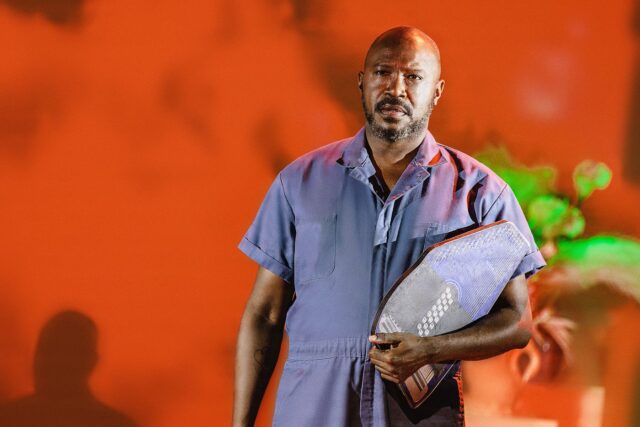
James Jackson Jr. saves the best for last in White Girl in Danger (photo by Marc J. Franklin)
It’s impossible to tell when the actors are portraying characters in Jackson’s White Girl in Danger and when they are characters in the soap-within-the-play, or if that’s the case at all. Fake promotional teasers and ads projected on a back screen prior to the show and during intermission (by Josh Higgason) are hard to hear (and most people don’t pay attention to them anyway). Projections during the show make it difficult to know where to look.
In the script, Jackson writes that Allwhite is “contradictorily a physical place, personal and national/global identity, and a point of view,” which makes it too perplexing for director Lileana Blain-Cruz to navigate through; she previously has successfully helmed such labyrinthine works as Fefu and Her Friends at TFANA, Anatomy of a Suicide at the Atlantic, and The Death of the Last Black Man in the Whole Entire World AKA the Negro Book of the Dead at the Signature but also, less successfully, the oversized The Skin of Our Teeth at Lincoln Center.
Raja Feather Kelly’s choreography, so distinct in A Strange Loop and such other shows as On Sugarland and We’re Gonna Die, gets lost in all the constant mayhem, along with Meg Zervoulis’s music direction. The score is performed by an unseen seven-piece band, with lighting by Jen Schriever that creates ominous shadows and sound by Jonathan Deans. Adam Rigg’s set is a whirlwind of color, as are Montana Levi Blanco’s costumes.
Early on, Nell tells Keesha, “It’s not for us to question the Allwhite Writer.” Keesha responds, “Well, I do question him. . . . We’re citizens of Allwhite too! So why do we always have to suffer and die? Why can’t we ever get a moment of truth like the Allwhites do?” Caroline answers, “Aw, Keesha! Our lives of nonstop pain and sorrow ain’t so bad! And without Police Violence Story Time, we wouldn’t matter at all!”
Michael R. Jackson, who will be performing “MichaelMakeYouFeelGood” August 21 and 22 at Lincoln Center’s “Restart Stages: Summersongs” free festival, has a lot to say about systemic racial injustice in White Girl in Danger, but the show is overloaded in every aspect. Jones does bring the house down with a near-showstopping number that begins, “There’s a void here inside me / It’s a void that I’ve longed to fill.” There’s a good musical somewhere in here, if someone is willing to dig deep.
In soap operas, you can watch one episode, then not tune in again for months, and it could be the same scene still going on. Time does not work the same way onstage, where there’s no room for excess and creators have to make their points quickly and succinctly. There’s a quality musical somewhere in White Girl in Danger, but it will take a lot more work to find it.
